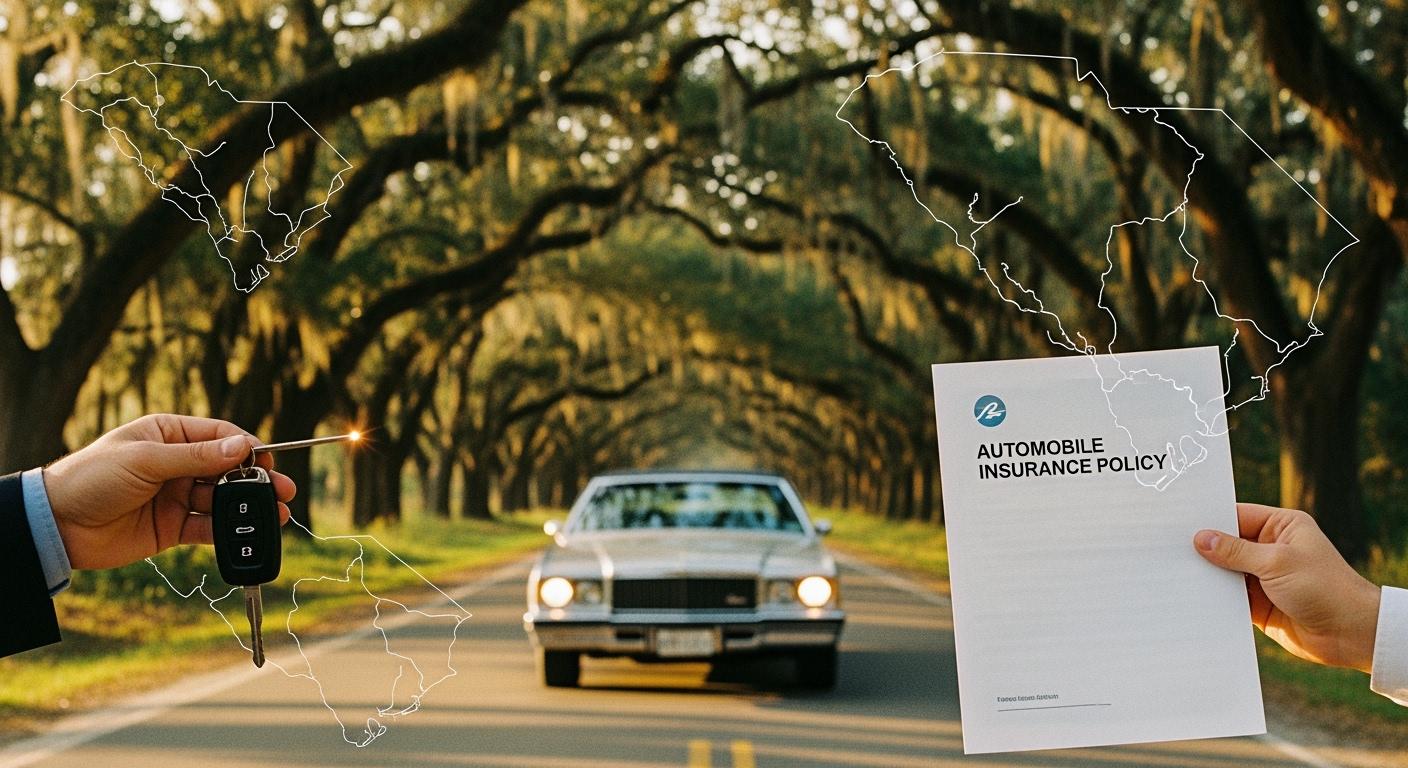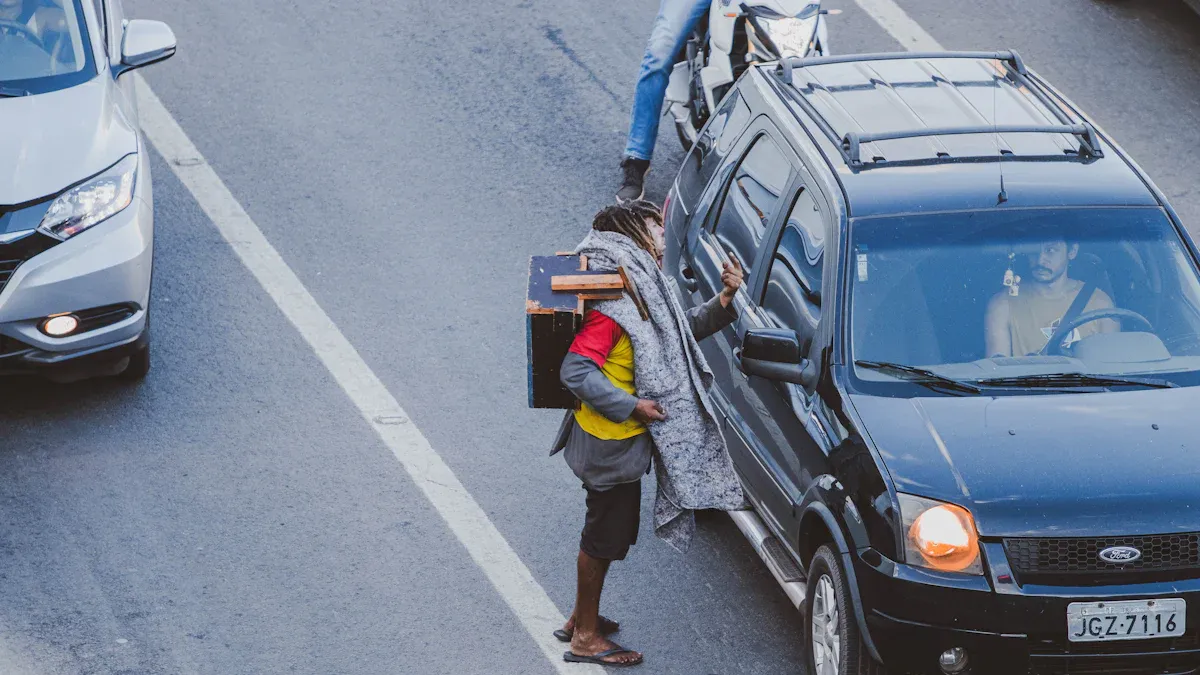
Imagine this: You borrow your neighbor’s SUV for a Kroger run on Buckwalter Parkway, or your teen takes the wheel to May River High. It’s natural to ask about car insurance driver vs car—does your policy protect the vehicle, the person behind the wheel, or both? In most cases, car insurance follows the car, not the driver. That means if someone else drives your car with your permission, your liability coverage usually steps in. However, certain protections—like medical payments—may follow the driver instead. Here in South Carolina and Georgia, the rules around car insurance driver vs car can get a little nuanced, but the focus is typically on the car itself. There are exceptions, so it’s smart to know how your policy works for both drivers and vehicles. Want a quick coverage check for Bluffton, Hilton Head, or anywhere along the Lowcountry?
Get a quote with GSP Insurance Group.
Key Takeaways
Car insurance usually goes with the car. This means your policy protects the car if someone else drives it and you say it is okay.
Personal Injury Protection (PIP) and Medical Payments Coverage (MedPay) help pay for your medical bills. They do this no matter which car you are in.
Always look at your auto insurance policy before you let someone borrow your car. Some policies have special rules about who can drive your car.
If you use someone else’s car, their insurance will usually pay first if there is an accident. Always make sure you have permission before you drive.
Check your policy often, especially when you add new drivers or cars. This helps you make sure you have the right coverage.
Car Insurance in the Lowcountry: The Basics
Insurance Follow the Car: What It Means
When you drive in Hilton Head or on US-278, you want to know how your car insurance works. In the Lowcountry, most auto insurance policies protect the car itself. If you let someone borrow your car, your car insurance usually covers the car, no matter who is driving.
Here are the most common types of auto insurance you’ll see in Bluffton, Hilton Head, and Beaufort:
Liability coverage: Pays for damage or injuries you cause to others.
Collision car insurance: Helps fix or replace your car after a crash.
Comprehensive insurance: Covers things like theft, storms, or a tree falling on your car.
Uninsured and underinsured motorist coverage: Helps if someone hits you and does not have enough insurance.
Personal injury protection or medical payments coverage: Pays for medical bills after an accident, no matter who caused it.
Gap insurance: Pays the difference if your car is totaled and you owe more than it’s worth.
Umbrella insurance: Adds extra liability protection above your regular policy.
Most of these coverages protect the car. If your friend borrows your SUV for a store trip and has a small accident, your auto insurance is usually the first to help. South Carolina and Georgia courts agree with this, especially when the car is used in a normal way, like carrying groceries or driving to work. So, when you give someone your keys, your insurance protects the car most of the time. This is true if you are parked at the Bluffton Oyster Factory or driving to Port Royal for lunch.
When Coverage Follows the Driver
Some auto insurance coverage helps you, no matter which car you drive. These include personal injury protection (PIP) and medical payments coverage (MedPay). If you get hurt in a crash, these coverages can help pay your medical bills—even if you are in a friend’s car or driving a rental.
Personal Injury Protection (PIP): Pays for medical bills, lost wages, and other costs after a crash, no matter who caused it.
Medical Payments Coverage (MedPay): Pays for medical expenses for you and your passengers after an accident.
If you have PIP or MedPay, you get help with medical costs whether you are driving your own car, riding with a neighbor, or walking in a parking lot and get hit. These coverages protect you, the driver or passenger, not just your car.
Permissive Use Explained
Let’s say your neighbor asks to borrow your car for a quick trip to Savannah. If you say yes, your car insurance usually covers them. This is called permissive use. In South Carolina and Georgia, the law says the owner is responsible for accidents when someone drives their car with permission. Even if you do not say “yes” out loud, leaving your keys in a shared spot can count as giving permission.
Here’s what you need to know about permissive use:
If you let someone drive your car, your insurance is the main coverage.
Giving permission can be a habit, like always leaving your keys on the counter.
Some policies limit how often someone can borrow your car—often up to 12 times a year.
Each trip counts separately, and your policy’s limits and deductibles still apply.
If you do not give permission, your insurance may not pay for damages.
Tip: Always check your auto insurance policy before lending your car. Some policies may have special rules or higher deductibles for permissive use.
In South Carolina and Georgia, permissive use is important. If you lend your car to a friend for a beach day or a store run, your insurance protects the car as long as you gave permission. If you have questions about how your policy handles permissive use, GSP Insurance Group can help you look at your options for full protection.
Car Insurance Driver vs Car: Real-Life Scenarios

Lending Your Car in Bluffton
Think about this. You let your friend use your car for a short trip in Old Town Bluffton. Usually, your car insurance driver vs car question is answered here. Your auto insurance is the first to help if there is an accident. If your friend crashes, your policy pays for the damage. If the damage costs more than your policy covers, your friend’s insurance might help next. If you did not say your friend could use the car, your insurance may not pay. In Georgia, you can get in trouble if you let someone drive who is not safe.
If your policy does not pay enough, the driver’s insurance might help.
No permission means your claim might not get paid.
Borrowing a Neighbor’s Vehicle
If you borrow your neighbor’s SUV for a Costco trip, the car insurance driver vs car rule still works the same way. The owner’s insurance is the main one that pays. If you have a small crash, their insurance pays first. If their insurance is not enough, your own insurance might help. Always ask before you drive someone else’s car.
Tip: Always talk to your neighbor and your agent before borrowing a car. Want to learn about tree or neighbor claims? Check our other article.
Rental Cars and Your Policy
You rent a car at Hilton Head Airport for a weekend. Your own auto insurance might cover you, but check your policy to be sure. Here is a quick chart:
Coverage Type | Personal Auto Insurance | Description |
|---|---|---|
Collision/Loss Damage Waiver | Collision/Comprehensive | Pays for damage to the rental, but you might pay a deductible. |
Liability Coverage | Liability Auto Insurance | Pays for injuries or damage you cause in the rental. |
Personal Accident Coverage | Medical Payments/PIP | Pays for medical bills if you or your passengers get hurt. |
Personal Effects Coverage | Home/Renter’s Insurance | Pays if your things are stolen from the rental car. |
Roadside Assistance | Roadside Assistance | Helps if you get a flat tire or run out of gas. |
Rental car companies sell extra insurance, but it might not cover everything. If you do not have your own insurance, you should think about buying extra. Want more info about rental cars? Read our article about rental car insurance.
Family, Teens, and Household Drivers
If your teen drives to May River High, you want to know how car insurance driver vs car works. Family policies let you add teens, spouses, or roommates. When your teen gets a permit or license, add them to your policy. This keeps everyone safe and might lower your bill.
Add people who live with you to your policy for better coverage.
Married couples often share one policy.
College students can stay on your policy if they live at your address.
Knowing the rules for teen drivers in South Carolina and Georgia is important. Need more help? We have a guide about teen driver insurance.
Company Cars and Work Vehicles
If you drive a company car for work in Beaufort, your boss’s insurance usually covers work trips. For personal trips, you might need your own insurance. Family members are not covered by your work policy. If you use your own car for work, make sure your insurance is right. Companies in more than one state might need special insurance.
Workers should have their own insurance for non-work trips.
Family members need their own insurance.
Ask about “Drive Other Car” coverage if you use many cars.
Rideshare, Delivery, and Golf Carts
If you drive for Uber, DoorDash, or use a golf cart in Hilton Head, the usual car insurance driver vs car rules change. Personal auto insurance does not cover rideshare jobs. You need special rideshare insurance. Golf carts need liability insurance, registration, and a driver’s license.
Coverage Type | Description |
|---|---|
Personal Auto Policy | Does not cover rideshare or delivery jobs. |
Rideshare Insurance | Needed for Uber/Lyft; fills gaps in your regular insurance. |
Delivery Services | Coverage is different; check your policy and state rules. |
Golf Cart Insurance | Liability insurance is needed for street use in SC & GA. |
Not sure if your teen or golf cart has the right insurance? Ask GSP. We can help you check your policy for full protection.
Exceptions and Exclusions in Car Insurance
All auto insurance policies have some limits. It is important to know what your policy covers. It is also important to know what it does not cover. Let’s look at some common exceptions and exclusions in South Carolina and Georgia.
Excluded and Non-Permissive Drivers
Not every person who drives your car is covered. If you list someone as an excluded driver, your insurance will not pay if they crash. This can happen if a family member has a bad driving record. Courts in South Carolina agree with this rule. In the USAA v. Pickens case, the court said insurance does not pay if an excluded driver causes a crash. This is true even for uninsured motorist claims.
If a non-permissive or excluded driver uses your car, here is what happens:
Your insurance will not pay for any damages or injuries.
You might have to pay for the costs yourself.
The insurance company does not have to help in these cases.
Always give clear permission before letting someone drive your car. If you want full protection, make sure you know who is covered.
Description | |
|---|---|
Willful or Intentional Injury | No coverage for injuries caused on purpose. |
Unlicensed Driver Exclusion | No coverage if an unlicensed driver causes a crash, unless the victim has uninsured motorist coverage. |
Named Driver Exclusion | No coverage for drivers you have excluded from your policy. |
Business Use Exclusion | No coverage if the car is used for business, but normal commuting is still covered. |
Commercial and Business Use
If you use your car for business, your personal insurance may not help. This includes making deliveries or driving for work. Driving to your job is okay, but using your car for business tasks is not.
Exclusion Type |
|---|
Intentional acts |
Nuclear risks |
War and military-related activities |
Wear and tear |
If you need to use your car for business, talk to your agent. They can help you get the right policy for your needs.
Out-of-State and Special Cases
If you drive outside South Carolina or Georgia, your insurance usually still works. But the rules can be different. Here are some things to remember:
South Carolina is an at-fault state. The driver who causes the accident pays for damages.
You must keep liability insurance that meets state minimums.
Out-of-state accidents do not change your rights. Your medical bills count, no matter where you get care.
If you have an accident in another state, you may need to follow different rules and work with other insurance companies.
Tip: If you travel a lot, check your auto insurance before your trip. Talking to your agent can help you avoid problems.
Quick Rules, Checklist, and Comparison Table

One-Glance Rules Table
If you lend or borrow a car, you want quick answers. This table shows who pays first and what to remember:
Situation | Whose Insurance Pays First? | What to Remember |
|---|---|---|
You lend your car to a friend | Car owner’s policy | |
You borrow a neighbor’s car | Car owner’s policy | Ask for direct permission before driving. |
Your teen drives your car | Family’s policy | Add teens to your policy for comprehensive insurance coverage. |
You rent a car | Your auto insurance | Check your policy for rental coverage. |
You drive for work (company car) | Employer’s policy | Personal trips need your own auto insurance. |
You drive for Uber/DoorDash | Rideshare policy | Personal auto insurance does not cover this. |
What to Do After a Borrow/Lend Accident
Crashes can happen anywhere, even in the Lowcountry. Here is a checklist to help you know what to do:
Make sure everyone is safe. Call for help if needed.
Share your name, phone number, and insurance with other drivers.
Take pictures of the cars, the scene, and any damage.
Write down if the driver had permission to use the car.
Call the car owner’s insurance company first. Their policy pays first.
If the damage costs more than the owner’s insurance, the driver’s insurance might help.
Lending your car can make your insurance cost more later.
Tip: Always talk to your agent before you let someone borrow your car. Giving clear permission is important for claims.
Building Comprehensive Protection
You want to feel safe when you lend or borrow a car. A good policy with higher limits and the right extras gives you better protection. Check your auto insurance to make sure it fits your life. This is important if you have a teen driver, share cars, or drive for work.
When to Review Your Policy
Things can change quickly in the Lowcountry. Look at your car insurance again when you:
Add a new driver or car
Move to a new home
Start a new job or use your car for work
Have a teen who starts driving
Lend or borrow cars a lot
If you lend or borrow cars often, check your limits and extras. GSP Insurance Group can help you review your policy or give you a quote today.
You have learned that liability coverage usually goes with the car. Some protections, like medical payments, might go with you as the driver. It is important to look at your policy for details. In South Carolina and Georgia, exceptions are important.
Look at your policy to see if any drivers are not covered.
Ask questions about business use or rideshare coverage.
Make sure your insurance matches your needs.
Want a fast and friendly policy check? Contact GSP Insurance Group. We can help you in Bluffton, Hilton Head, and all over the Lowcountry.
FAQ
Does my car insurance cover someone else driving my car in South Carolina or Georgia?
Yes, your insurance usually covers your car if you say it is okay. Your policy pays first if there is a crash. Always look at your policy for special rules or things not covered.
What happens if I borrow a car and get into an accident?
The car owner’s insurance pays first if you crash. If the damage costs more than their policy, your own insurance might help. Always ask before you drive someone else’s car.
Do I need to add my teen driver to my policy?
Yes, you should add your teen when they get a permit or license. This keeps your family safe and stops any gaps in coverage.
Does my personal auto insurance cover me when I drive for Uber, Lyft, or DoorDash?
No, your personal policy does not cover rideshare or delivery jobs. You need special rideshare insurance for those trips. Ask your agent about adding this protection.
What should I do if I lend my car and there’s an accident?
Make sure everyone is safe. Share names and phone numbers. Take pictures of the cars and the scene. Call your insurance company. Write down if you gave permission. Your policy will handle the claim first.
